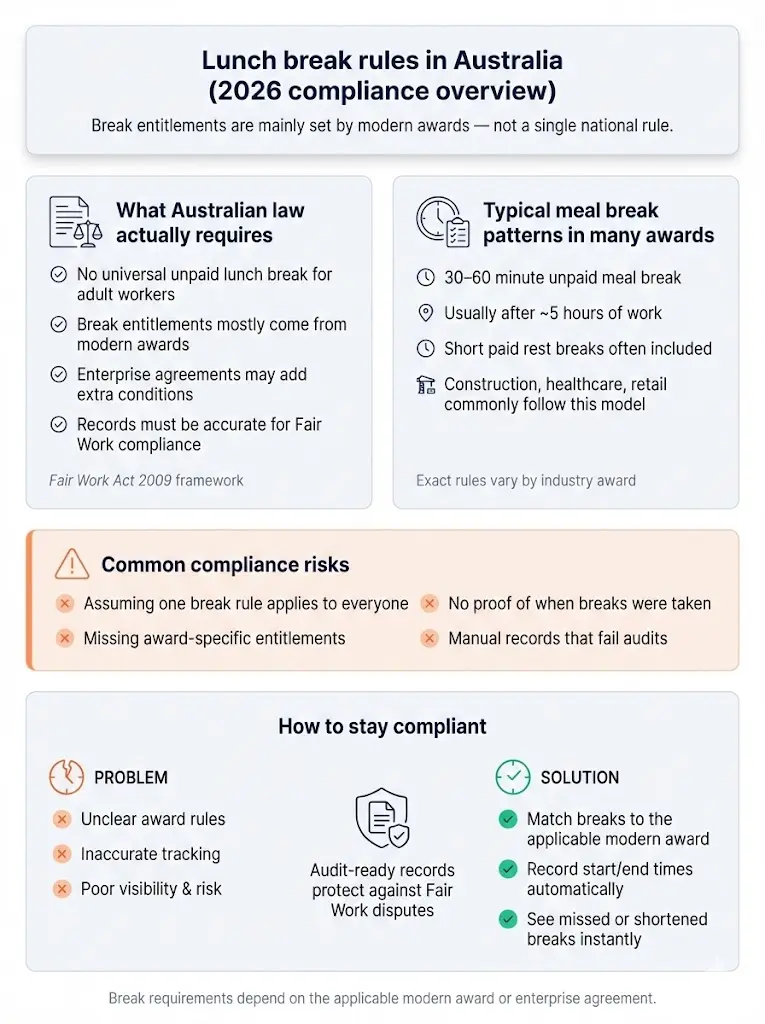Lunch Break Laws in Australia: What Every Employer Needs to Know



According to the Harvard Business Review, well-rested and refreshed employees are happier, healthier, and more productive. Lunch break laws in Australia are designed to protect workers’ well-being while also benefiting employers through improved employee work performance and morale.
This comprehensive guide provides Australian employers with the information needed to understand and comply with lunch break laws, ensuring their workplaces are legally compliant and supportive of employee rights.
Disclaimer: This article provides general information about lunch break laws in Australia and is not a substitute for professional legal advice. Always consult with a qualified legal expert for guidance on specific situations or complex legal matters.
Lunch break laws in Australia: General guidelines
Fair Work Australia (FWA) recognizes that employees are entitled to work breaks. However, break entitlements vary depending on the industry, hours worked, and individual employment agreements.
Breaks fall into two main categories:
- Rest Breaks. These are short rest periods (usually 10 minutes) taken during work hours to allow employees to rest and recharge. They are often referred to as ‘tea breaks’.
- Meal Breaks. These are longer breaks (typically 30-60 minutes) during which employees can rest and eat a meal away from their work area.
To determine your employee's break entitlements, review the relevant modern award or enterprise agreement pertaining to their employment. These legal documents outline the minimum standards for various aspects of employment, including break times.
Important: If a required break isn’t provided under the applicable award or agreement, employers must pay penalty rates until the break is taken, and repeated breaches can lead to Fair Work penalties and back pay claims.

While specific break entitlements vary, some general principles apply across most industries:
- 5-Hour Rule. Employees are generally entitled to a break after working 5 continuous hours. This break entitlement applies to most industries in Australia.
- Shift Workers. Employees need breaks between shifts to rest and recover from long workdays. Most full-time employees work an average of 7.6 hours per day (38 hours per week) after breaks.
- Reasonableness. Break entitlements should be reasonable and consider the nature of the work being performed. For example, employees whose work is physically demanding may require more frequent or longer breaks.
Lunch break specifics
Lunch breaks allow employees to refuel and refresh. Although these breaks are not legally required under the Fair Work Act, modern awards, enterprise agreements, and employment contracts usually include lunch breaks.
They typically range from 30 to 60 minutes, depending on the award or registered agreement. Document specifics also specify whether these breaks are paid or unpaid.
Lunch breaks should be scheduled at reasonable times, giving employees adequate time to eat and relax. Employees concerned about the timing or duration of their lunch breaks can raise these concerns with their employer.
Crib Breaks
A crib break is a specific type of paid meal break, often shorter in duration (around 20 minutes). It is used by shift workers who may need to be available to respond to urgent situations and employees who are required to remain on-site or in their work area during their break.
Rest break specifics
In addition to meal breaks, employees are also entitled to rest breaks. These are typically shorter breaks, usually around 10 minutes, that provide employees with a short time to rest physically and mentally during their workday.
Rest breaks are most often paid breaks and are considered part of an employee’s ordinary hours of work. The frequency and duration of rest breaks can vary depending on the industry and specific employee award or agreement.
Other break entitlements
In addition to rest and meal breaks, employees are entitled to other breaks as necessary for their well-being and safety.
These breaks include, but are not limited to:
Toilet Breaks
Employees have the right to use the bathroom whenever they need to. Denying workers this fundamental right can severely violate workplace health and safety regulations.
Water Breaks
Employees should have access to drinking water and be allowed to take breaks to hydrate, especially in physically demanding jobs or hot environments.
Breaks for Personal Needs
Employees may be entitled to additional breaks for personal needs such as medical conditions or breastfeeding.
The role of Fair Work Australia
Fair Work Australia is the national workplace relations tribunal. It is responsible for setting and enforcing standards for various aspects of employment, including break entitlements.
Fair Work Australia handles vital employment matters such as:
- Pay and leave entitlements
- Employment conditions
- Workplace issues and disputes
- Bullying, harassment, and discrimination
Fair Work Australia provides specific guidelines and instructions to industries and sub industries regarding break awards. Let’s take a look at a few examples of awards below.
Building and construction award
Building and construction industry employees are generally entitled to a 10-minute paid rest break and a 30-minute unpaid meal break each day.
Employees must take a mandatory meal break after working 5 hours. Additionally, the meal break must be taken within a specific timeframe. Employers who fail to provide meal breaks run into the risk of compensating employees with double-time pay.
Additional provisions relate to wash time and hot/cold work breaks. Keep in mind, if an employee works over 20 hours during their shift, a 12 hour break between shifts is required.
It's important to note that specific sub-industries may have their own awards with slightly different break provisions. For instance, the Plumbing and Fire Sprinklers Award can potentially extend employee meal breaks to 45 minutes.

If an employer fails to give employees their required breaks, penalty rate compensation must be paid to workers. This rate is equivalent to double the regular rate of time and a half for sprinkler fitter employees under the Plumbing Award.
Health professionals and support services award
The healthcare sector has more flexible break arrangements. Healthcare support employees are given 10-minute paid rest breaks and 30 to 60-minute unpaid meal breaks. The frequency of these breaks depends on the number of hours worked
This award provides flexibility in the timing of breaks and offers employees the option to forego meal breaks in lieu of shorter shifts. Additionally, there are no financial penalties for employers who don't provide meal breaks. However, a 10-hour break between shifts after working overtime is mandatory.
Hospitality industry (general) award
Hospitality workers receive one 20-minute paid rest break during a shift in which they work over 8 hours and two breaks for shifts in which they work over 10 hours. Employees can opt to take two 10-minute breaks instead of one 20-minute break if desired.
Employees are entitled to a 30-minute unpaid meal break after 6 hours of work. The award is flexible regarding meal break timing, but the break cannot be taken within the first 2 hours of work or any time after 6 hours into their shift.
If a meal break is missed, employees must be paid time-and-a-half until they receive their break. A 10-hour break between shifts is required, reduced to 8 hours in case of roster changes.
PRO TIP: Modern awards vary significantly and are never one-size-fits-all. Each award has unique break rules. Always consult the specific award for your employees to maintain legal compliance and avoid costly penalties.
Employer obligations and responsibilities
As an employer, you have a legal and ethical obligation to provide your employees with the breaks they are entitled to under the lunch break law in Australia.
Failure to do so can result in:
- Legal Consequences. Violating lunch break laws canresult in underpayment claims, back pay orders, and Fair Work penalties.
- Decreased Productivity. Tired and overworked employees are less productive and more prone to make mistakes.
- Low Morale and Increased Turnover. A lack of respect for employee well-being can create a negative workplace culture and lead to high turnover rates.
If an employee believes their workplace rights have been violated, they can file a complaint with the Fair Work Ombudsman for investigation.
To ensure compliance with break laws, it's crucial to:
- Know the Law. Familiarize yourself with the relevant modern award or enterprise agreement that applies to your employees.
- Schedule Reasonable Breaks. Provide scheduled breaks at appropriate times and reasonable durations.
- Communicate Clearly. Communicate break entitlements to your employees through employee handbooks, regular team meetings, or individual discussions. Encourage your workers to take their breaks. Consider implementing meal break violation write-ups for employees that consistently skip their breaks.
- Keep Accurate Records. Maintain accurate records of employee breaks, including start and end times. Break records demonstrate your company’s compliance with the law and ensure employees are compensated accurately.
Looking to increase break compliance in the workplace? Learn about the benefits of creating an employee break policy and download a free customizable policy template to get started.
Workplace health and safety
Providing adequate breaks to employees is an important part of maintaining workplace health and safety. Safe Work Australia emphasizes the importance of breaks to prevent fatigue, stress, and other health conditions.
To encourage a safe and healthy work environment, employers should:
- Identify and Manage Risks. Assess the risks associated with specific jobs and implement measures to mitigate those risks, including adequate break times.
- Provide Training. Train employees on workplace health and safety procedures, including the importance of taking scheduled breaks.
- Encourage Open Communication. Create a safe workplace culture where employees feel comfortable raising concerns about their health and safety.
How Timeero can help Australian employers manage breaks and maintain compliance
We understand that you may find it challenging to navigate the complexities of Australia’s break laws. Timeero, a leading GPS time-tracking software, offers features designed to automate break management and maintain compliance with both national and industry-specific regulations.
We’ve highlighted Timeero’s features that best help with break management below.
Enforcing Break Policies
Timeero allows you to create and enforce your company’s break policies in alignment with the relevant employee award or agreement.

Timeero allows you to customize break specifics such as: break types (rest, meal, etc.), break duration, and whether they are paid or unpaid. You can also set break variations for different employee groups, such as shift workers or those with specific industry requirements.
Tracking and Recording Breaks
Employees can easily log their breaks using Timeero’s mobile app, providing accurate records for employees and employers.

Managers can easily view employee break records which encourages transparency and reduces the risk of non-compliance with Australian break laws.

With Timeero’s time tracking capabilities, employers can monitor break usage in real-time and prevent timesheet fraud among employees working in the field or at multiple locations.
Reminding Employees to Take Breaks

Schedule breaks and send break reminders to employees with Timeero’s scheduling feature. Break reminders can be customized to align with specific employee award or agreement requirements.
Generating Break Reports
Timeero simplifies compliance audits by generating detailed reports on employee break usage. These reports can be invaluable in demonstrating compliance with Fair Work Australia regulations.

Customized reports can also be used to identify patterns regarding break usage to optimize scheduling and improve overall workforce management.
Additional Benefits

Beyond break tracking, Timeero offers a wide range of features that can help Australian employers manage their workforce effectively.
These features include:
- Time and overtime tracking. Accurately record employee work hours and attendance. Stay compliant with Australian overtime laws and award rates.
- Electronic signatures. Employees can verify their work hours by adding digital signatures to timesheets.
- GPS tracking. Monitor employee locations in real-time, improving efficiency and employee safety.
- Mileage tracking. Automatically track employee mileage and reimburse workers accurately.
- Scheduling and Leave Management. Simplify the process of scheduling, tracking, and approving employee leave requests.
- Reporting and analytics. Gain insights into workforce trends and identify areas for improvement.
By leveraging Timeero's comprehensive features, Australian employers can manage employee break entitlements, ensure compliance with the law, foster a positive workplace culture, and boost productivity.
Want to learn more about Timeero’s features and benefits? Be sure to check out our detailed Timeero review.
If you're interested in learning about regulations in the US, you can check out our comprehensive guide on Lunch and Break Laws by State.
Lunch break laws in Australia: FAQ
How long is a typical lunch break for full-time employees in Australia?
A typical lunch break lasts 30 to 60 minutes, although the duration depends on the industry and the specific employment award or agreement.
Are lunch breaks mandatory for full-time employees in Australia?
While not explicitly mandated in the National Employment Standards, most awards and agreements do include provisions for meal breaks. It's generally considered best practice to provide lunch breaks for employee well-being and productivity.
Are employers required to provide lunch breaks in Australia?
Yes, employers are generally required to provide lunch breaks per the relevant award or agreement covering their employees.
Can I force an employee to take a break?
No, you cannot force an employee to take a break. However, it’s recommended that you encourage employees to take their allocated breaks for their health and well-being.
What does Fair Work Australia say about work breaks?
Fair Work Australia emphasizes the importance of providing adequate breaks for employees to rest and recuperate. Specific break entitlements are detailed in relevant awards and agreements.
How many breaks do you get in an 8-hour shift in Australia?
This depends on the industry and award. Generally, employees working an 8-hour shift would be entitled to at least one rest break (10 minutes) and one meal break (30-60 minutes).
How many breaks are there in a 12-hour shift in Australia?
Employees working a 12-hour shift are typically entitled to multiple breaks, including rest and meal breaks. The number and duration of breaks will depend on the specific industry and award.
How long can you legally work without a break in Australia?
Employees are usually entitled to a break after working 5 hours continuously. However, this can vary depending on the industry and award.
Are rest breaks paid in Australia?
Yes, rest breaks are typically paid and considered part of an employee's working time. However, meal breaks are often unpaid unless specified otherwise in the award or agreement.





.png)
.png)

.png)




